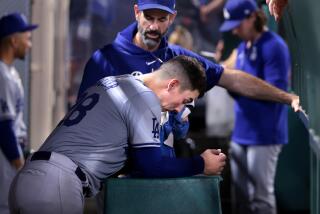Bode Miller gets another turn, with a twist
What’s good for Bode Miller is good for America. What?
Ridiculous as that reads, four years after his enfant terrible turn at the 2006 Turin Olympics, there may be a ski tip of truth to it.
With the Vancouver Olympics fast approaching, we’d like to report Miller is reciting acts of contrition while negotiating a couch summit with Oprah to explain his boorish behavior in Italy, where he failed to win anything or anybody over -- unless you count bartenders.
Let’s not get crazy.
“As far as I know,” Miller, the pragmatic, said, “I don’t think you can undo anything.”
Yet, when Miller returned to the United States Ski Team last September, after years of going it aloof and alone, the Alpine icon signaled a thaw in the conformity cold war.
Miller was approaching his 32nd birthday, had recently fathered a daughter, Dacey, and was coming off a winless season on the World Cup. He was battling injuries, had not trained in months and the deadline for his final Olympics try was approaching.
Look at it this way: Miller and the U.S. Ski Team made their points. After splitting with Uncle Sam following the 2006 Olympics, a mutual parting if there ever was one, the brilliantly obstinate Miller proved he could win his second World Cup overall title (in 2008) on his own, hiring his own staff while traipsing around Europe in unbridled exuberance.
The U.S. Ski Team proved it could exist without Miller, while producing a world star of his equal, Lindsey Vonn, within the confines of structure.
The farther the parties got away from Italy, and the closer it got to Vancouver, the more reconciliation made sense.
Going it alone, Miller found out, is expensive. On the flip side, every day Miller spent training with U.S. skiers improved the country’s chances for medals in Vancouver.
Miller might have been a pariah in the ski lodge when it came to authority and rules, but his U.S. record 32 World Cup victories and virtuoso hill skills garnered the utmost respect from his peak peers.
“Bode’s a star,” Alpine teammate Steven Nyman said. “He’s constant speed, somebody we can gauge ourselves off of. It’s a huge benefit. Training with him pushes our team. We know he’s fast, he’s a target and we go after that target.”
Ted Ligety, who claimed Turin gold in the combined event Miller was supposed to win, heartily welcomed Miller’s return.
Ligety on Bode: “He’s been such an innovator of the last 10 years in the sport. It’s great to have someone like that to train with day in and day out.”
For up-and-comers such as rookie Olympian Andrew Weibrecht, skiing with Miller is like hooping with Michael Jordan.
What do you even say on the chairlift ride?
“Obviously, I was intimidated,” Weibrecht joked. “He’s one of our sport’s best ever. But once I found he’s super accessible and approachable, I’ve always liked having him around. He has a great eye for specifics as far as tactics. I’ve definitely benefited for having him on the team.”
As for Italy, well, in hindsight, it was only 90% Miller’s fault.
He was promoted as capable of winning five Olympic medals because he had won World Cup events in all five disciplines.
The widely fluctuating variables in ski racing -- weather, snow conditions, wax, equipment choices -- should have been given more consideration.
“It’s not like somebody in track and field where, if you’re the best in the world in that event you’re supposed to win, you’re almost guaranteed to win,” Ligety said. “Ski racing’s the exact opposite. If you’re the favorite, most of the time you’re not going to win. It’s such a finicky sport.”
All late-night partying aside, Miller did not ski poorly in Italy. He missed a downhill bronze by .11 and was leading the combined by almost a second before he snagged a slalom gate. He tied for sixth in giant slalom and did not finish the super-G and slalom.
No one can say how much even one medal for Miller might have salvaged Turin -- that’s one of the things you can’t undo.
“I think maybe the pressure got to him,” Vonn ventured. “I don’t know. With so many people breathing down your neck, it’s tough to deal with.”
This time, people are breathing down Vonn’s neck, while Miller sneaks through Vancouver’s back cabin door.
He seemed ready to retire until coaxed to return last spring by U.S. men’s head coach Sasha Rearick.
What happened, Rearick offered, was the result of locking “two passionate people in a room. . . . We talked a lot about heart.”
Miller agreed to go rah-rah for Team USA, yet was woefully behind in conditioning after a seven-month sabbatical. “One of the things you can’t do is skip the training,” he said. “There’s no short-cutting it.”
He had not, though, abandoned hope: “When I got my foot on the gas, the potential is certainly there.”
Miller announced his return in September, throwing the press for a loop with his opening remarks: “Thank you guys for coming here.”
Miller fell short of saying he was sorry for anything. “I think my actions will carry a lot more weight,” he offered. “I hope that is what I’m judged by.”
True to his words, Miller enjoyed a benign fall. He declined to speak with reporters in November at a pre-Olympic media summit in Colorado, but this season was about actions, remember, over words.
His results have mostly been un-Bode like. Miller ranks No. 15 in the World Cup overall standings, with a respectable seven top-10 finishes.
Miller flashed a glory glimpse, though, in January at a combined event in Switzerland, his first World Cup win since 2008. Days later, he finished ninth in the famed downhill in Kitzbuehel, Austria.
Bode’s foot back on the gas?
Miller has ceded (happily) the face of these Olympics to teammate Vonn, winner of nine World Cup races this year.
Vancouver, for Miller, is a last start-gate stand after winning two silvers at the 2002 Salt Lake City Games and getting tanked in Turin.
After a rise and fall, redemption is all that’s left.
“It’s still Bode,” teammate Marco Sullivan said.
The world press dog-piled on Miller for the way he skied and acted in Italy, so seemingly disrespectful of sleep and Olympic-ideal mantras.
So is Vancouver a chance to rewrite the ending?
Rearick, the coach who coordinated Miller’s return, did not hesitate with his answer:
“Yes.”
More to Read
Go beyond the scoreboard
Get the latest on L.A.'s teams in the daily Sports Report newsletter.
You may occasionally receive promotional content from the Los Angeles Times.







